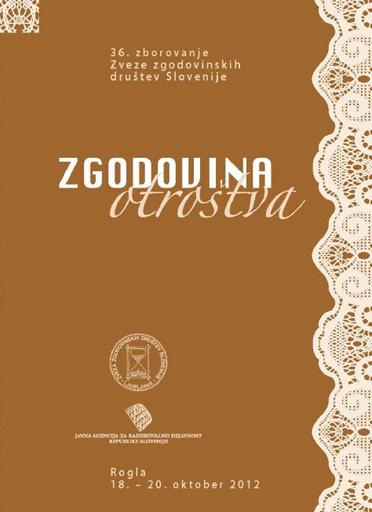/
Dogodki
/
Konference
Skrbništvo mladoletnih v jugovzhodnem delu Goriških brd v 1. polovici 19. 1 - stoletja - pravni vidik in realnost


To delo avtorja Tanja Gomiršek je ponujeno pod Creative Commons Priznanje avtorstva-Nekomercialno-Brez predelav 4.0 Mednarodna
Datoteke (1)
Opis
The writer of the Franziscean cadastre elaborate had written about husbands in Goriška brda that they are “submitted to the incredible effort, which is the cause for their long childhood and short life time and the majority of adults (men) have a hernia and a rounded back “. Because of the frequent dying of one of the spouses the society was facing a number of underaged children without one parent. In the first half of the 19th century there were 419 cases of death of either father or mother in that area and in 128 of those cases the presence of minor children was recorded. The court always appointed a legal guardian for them. In case of mother’s death the father was named a guardian and in case of father’s death besides the mother a co-guardian was named, usually another family member or otherwise related male person. Legally, the guardian was managing the heritage for the orphan, raised an orphan and that is why he got a part of the income of the proteges’ property. For guardians of minors with a significant heritage thus assignement meant finanicial benefits. Caring for the children of poor tenants was connected with the resolving of social issues within the family or village structure.
Metapodatki (12)
- identifikatorhttps://hdl.handle.net/11686/37798
- naslov
- Skrbništvo mladoletnih v jugovzhodnem delu Goriških brd v 1. polovici 19. 1 - stoletja - pravni vidik in realnost
- Custody of Minors in the South-Eastern Part of Goriška Brda in the First Half of the 19th Century – the Legal Aspect and the Reality
- ustvarjalec
- Tanja Gomiršek
- soavtor
- Peter Štih (mod.)
- predmet
- Goriška brda
- skrbništvo
- mladoletne sirote
- otroško delo
- Goriška brda
- custody
- minor orphans
- child labour
- opis
- Zapisovalec elaborata franciscejskega katastra je o možeh v Goriških brdih zapisal, da so »podvrženi neverjetnim naporom, kar je vzrok njihovemu dolgemu otroštvu ter kratki življenjski dobi in večina odraslih (moških) ima kilo in upognjen hrbet«. Družba se je zaradi pogoste smrti enega od zakoncev srečevala s kopico mladoletnih otrok brez enega roditelja. Zanje je bil na sodišču vedno določen skrbnik. Pravno gledano je skrbnik za siroto upravljal dediščino, jo preživljal in vzgajal, zato mu je pripadal del dohodka varovančevega premoženja. Za skrbnike mladoletnih z znatno dediščino je ta zadolžitev pomenila finančne ugodnosti. Skrb za otroke iz ubožnih družin zakupnikov pa je bila povezana z reševanjem socialnih vprašanj v okviru sorodstvene oziroma vaške strukture.
- The writer of the Franziscean cadastre elaborate had written about husbands in Goriška brda that they are “submitted to the incredible effort, which is the cause for their long childhood and short life time and the majority of adults (men) have a hernia and a rounded back “. Because of the frequent dying of one of the spouses the society was facing a number of underaged children without one parent. In the first half of the 19th century there were 419 cases of death of either father or mother in that area and in 128 of those cases the presence of minor children was recorded. The court always appointed a legal guardian for them. In case of mother’s death the father was named a guardian and in case of father’s death besides the mother a co-guardian was named, usually another family member or otherwise related male person. Legally, the guardian was managing the heritage for the orphan, raised an orphan and that is why he got a part of the income of the proteges’ property. For guardians of minors with a significant heritage thus assignement meant finanicial benefits. Caring for the children of poor tenants was connected with the resolving of social issues within the family or village structure.
- založnik
- Zveza zgodovinskih društev Slovenije
- Inštitut za novejšo zgodovino
- datum
- 2012
- 19. 10. 2012
- tip
- video
- jezik
- Slovenščina
- Angleščina
- jeDelOd
- pravice
- licenca: ccByNcNd
